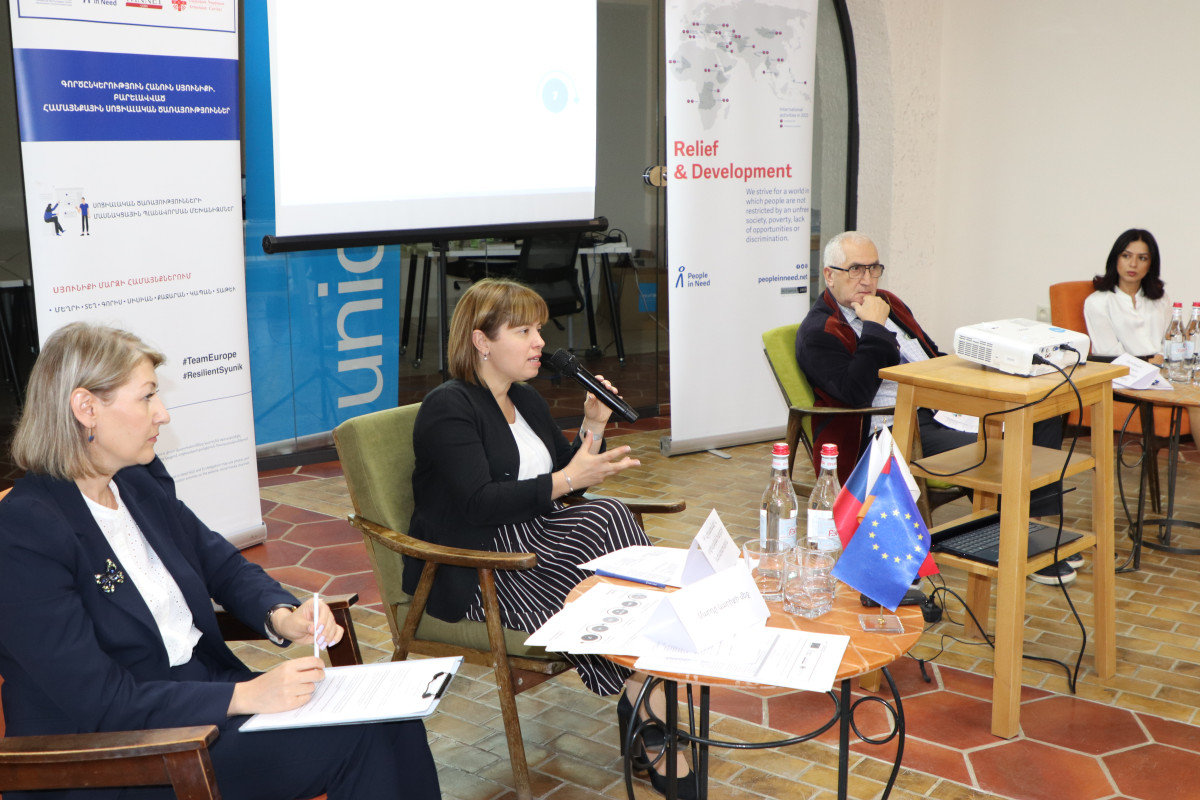Community Development through Participatory New Models: New Social Services in Syunik, Armenia
Published: Aug 14, 2025 Reading time: 4 minutes Share: Share an articleIn recent years, we have focused primarily on community development, particularly improving access to needs-based social services. Civil society organisations, state institutions, and local governments now collaborate to deliver social services through joint and participatory programmes.

The Syunik region is expanding its social services by introducing new delivery formats that complement programmes run by local civil society organisations. With funding from the European Union, the Sisian, Goris, Kapan, and Meghri municipalities have introduced initiatives to provide social services. These programmes are co-financed by the municipalities and have been included in municipal council decisions to ensure their continuity.
In these four municipalities, the following services are being prepared and will soon be launched:
• Sisian – a social taxi for people with mobility impairments;
• Goris – hydrotherapy services for children with special needs;
• Kapan – a temporary shelter for homeless people;
• Meghri – a social inclusion centre for children.
Ashot Giloyan, Head of the Local Self-Government Policy Department of the Ministry of Territorial Administration and Infrastructure, explained, “These actions to ensure the accessibility and affordability of social services in communities are important not only for various social groups, but are also significant in the context of the decentralisation processes planned in our country. The government’s adopted decentralisation policy seems to be entering a new phase, particularly after the Concept on Decentralisation of Powers was approved by the Prime Minister on 9 November 2023. As a result, the Ministry is now developing a draft decentralisation strategy.
Social services are crucial within the decentralisation policy. In this regard, we highly value the comprehensive legislative changes in social support that came into force on 30 October 2024, and the opportunities these laws granted communities to deliver social services. Local governments should be part of the social services network. Since they're closest to residents, they understand local social problems better than any other level of government.”
Giloyan continues, “However, for a community to take measures to meet real needs, such as providing social services, efforts must be made not only to provide the institutional tools necessary for communities but also to create, introduce, and operate the required social infrastructure. The Partnerships for Syunik – Enhanced Community-Based Social Services project and its results are significant, as their components address social services and engage all stakeholders, and form the relevant infrastructure for delivering social services, as I have mentioned.”
Varduhi Dadunts, country director of PIN Armenia, says, “We value the opportunities for sustainable financing and are pleased that this model is being successfully applied within the framework of effective cooperation with communities. By supporting communities in the introduction and piloting of services, as well as supporting the development of technical capacities, we are confident that these investments will continue to serve the needs of community residents, and that communities will be able to expand successful experiences.”
Through the joint efforts of People in Need, the WINNET Goris Development Foundation, and Armenian Caritas, the three-year Partnerships for Syunik – Enhanced Community-Based Social Services project has been offering integrated solutions since 2023. In addition to the four municipal initiatives mentioned above, 10 local civil society organisations have established free community-based social services in the Sisian, Tegh, Goris, Tatev, Kapan, Kajaran, and Meghri communities, thanks to grants and municipal co-financing.
Around 500 Syunik region residents are already benefiting from these services. Thanks to the project, four civil society organisations operating in the Syunik region have received state certification, enabling them to implement state-announced grant programmes.
The social services provided under the project include: home and day care, temporary shelter, housing accessibility, social taxi services, and entrepreneurial programmes. As part of the project, we organised study visits to the Czech Republic and Estonia to explore European best practices in the social sphere.
We also produced a film to share the story of the project.
The Partnerships for Syunik – Enhanced Community-Based Social Services project is implemented by People in Need within the framework of the European Union’s Resilient Syunik – Team Europe Initiative, in cooperation with the WINNET Goris Development Foundation and Armenian Caritas. This work has been made possible thanks to cooperation with civil society, Armenia’s Ministry of Labour and Social Affairs, the Ministry of Territorial Administration and Infrastructure, the Syunik Regional Administration, local government bodies, and the social committees of all seven regional municipalities.
The Resilient Syunik – Team Europe Initiative is a joint programme involving the European Union, the European Investment Bank, the European Bank for Reconstruction and Development, ten EU Member States (Austria, Czechia, Estonia, Finland, France, Germany, Lithuania, the Netherlands, Poland, and Sweden), and Switzerland. This initiative promotes sustainable socio-economic development in the Syunik region.

